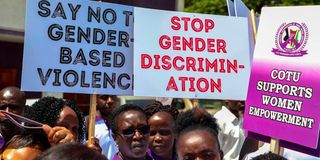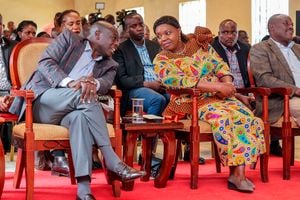Champions speak: Here’s how to beat gender-based violence

The Central Organization of Trade Unions (Cotu) mark 16 Days of Activism at Solidarity House Nairobi, on December 8, 2022. They called for the ratification of the ILO Convention 190, which speak to end violence and harassment in the work place.
What you need to know:
- We are just emerging from the Covid-19 pandemic, elections, and drought, we should rebuild better and address the nexus of issues affecting women and girls.
- Grassroots women and youth groups should be educated on the various forms of GBV and how to address them at the community level.
- To address online GBV, we need multi-stakeholder policy interventions between social media users, tech companies, app developers, law enforcement agencies and civil society organisations.
The 16 days of Activism Against Gender-Based Violence under the theme ‘UNITE! Activism to end violence against women and girls’ is now on its tail end. In line with this, front-line human rights defenders and women’s rights’ organisations spoke to the Nation.Africa and put forward proposals on how we can win the war against all forms of gender-based violence.
Alberta Wambua, Executive Director, Gender Violence Recovery Centre

Gender Violence Recovery Centre (GVRC) Executive Director Alberta Wambua (right).
I support the rallying voice that all GBV programs should focus on the practice-based knowledge that players have gained in the process of developing and implementing their respective projects. This way, we get to synthesise learning and improve subsequent programming. In the spirit of leaving no one behind, the survivor-centred and multi-sectoral service provision approach will bear fruits.
As we are just emerging from the Covid-19 pandemic, electoral period, and now drought, we need to rebuild better and address the nexus of issues affecting women and girls.
There is no meaningful development when violence is not addressed, and we remain alive to the existing higher demand for GBV services. This is why we must work together and fully commit to eradicating GBV and support survivors to heal.
Wairimu Munyinyi-Wahome, Executive Director Coalition on Violence against Women (Covaw)

Coalition on Violence against Women (Covaw) Executive Director Wairimu Munyinyi-Wahome.
We need to move away from the culture of developing grand GBV plans of actions that are difficult to implement due to a perpetual shortage of resources including finance.
If we want to push forward actions to address GBV, the government must prioritise the safety and protection of mostly women and girls, by ensuring gaps that hinder delivery of policy and practice of GBV responses are fully met.
This includes fulfilling the obligation to actualize the two-thirds gender principle to address the structural violence that continues to exclude women from leadership and decision-making roles.
As we mark the 16 Days of Activism, urgency in translating commitments made towards addressing GBV in Kenya into actions, should be among the top priorities of the government.
Wairimu Muchai, Program Coordinator Unesco Youth Forum

Wairimu Muchai, Program Coordinator Unesco Youth Forum.
Education is a key driver of change, and so I propose that grassroots women and youth groups be educated on the various forms of GBV and how to address them at the community level. Having caravans that communicate with the communities in their languages would also have more impact because people understand information better when it is passed in a language they understand. We need strong advocacy campaigns focusing on policy implementation, which address socio-economic inequalities.
Additionally, less than 40 per cent of GBV survivors seek help. This indicates the stereotypes they face when speaking up. Survivors should have access to confidential and secure services that will assist them in rebuilding their lives.
Elizabeth Ziro, Kilifi-based human rights defender

Elizabeth Ziro, Kilifi-based human rights defender.
We need to work on empowering girls on how to prevent all types of GBV. I believe that early intervention and prevention is the strongest resource to fight gender inequality. One of the best strategies is investing in life skills’ development amongst young girls, thereby creating changes in social and cultural norms. This will guide girls into becoming confident and brave. Girls who are self-aware, make informed decisions and believe in the power of their dreams.
Patience Nyange, Executive Director Association of Media Women in Kenya (Amwik)

Patience Nyange, Executive Director at the Association of Media Women in Kenya (Amwik).
The media has a role in mitigating the risks of GBV through sensitive reporting. Insensitive and unethical media reporting is listed among reasons behind society shunning and shaming survivors. The media has to sensitise the masses on core principles that dignify humanity and as provided for by the Constitution. Any story that violates the ethical principles of journalism must be retracted to avoid further damage.
In challenging societal expectations where survivors have nowhere to report their issues, human rights organisations can provide the much-needed link between survivors and the media. The media, in their reportage, must highlight the legal and social ramifications of GBV, as a continuous reminder to perpetrators that there are punishments as prescribed by the law of the land.
Angela Minayo, Women Digital Rights Programs Officer at Kenya ICT Action Network (KICTANet)

Angela Minayo, Women Digital Rights Programs Officer at Kenya ICT Action Network (KICTANet).
We are in the digital age and we have seen women trolled online for their choice of dressing, political stance and being in the public eye. While the attacks might appear random, the trolls target women and sexual minorities based on social construct of what it means to be a man or a woman. To address this, we need multi-stakeholder policy interventions between social media users, tech companies, app developers, law enforcement agencies and civil society organisations. Survivors are also encouraged to first document the online gender-based violence (OGBV) content by taking screenshots so that they can be used as evidence of abuse in court. Thereafter, security agencies and the Judiciary should hold perpetrators accountable.
Stephen Nzusa, Director Teen Pregnancy Awareness Kenya

Stephen Nzusa, Director Teen Pregnancy Awareness Kenya.
There should be more capacity building for safe houses. Most organisations can accommodate just a few victims over time, but the major challenge is inadequate skills’ programs that would help survivors develop self-awareness once they come out of the safe houses. I propose that survivors be taken through self defence programs that allow them to face off offenders. This will scare perpetrators knowing fully their victims are no longer timid souls or afraid. I believe the organisations can be trained on these programs so that the survivors have an all-round solution in case of recurring incidents.
Vanessa Dorcas, Lead Gender Affairs at Spread Truth Africa

Vanessa Dorcas, Lead Gender Affairs at Spread Truth Africa.
Forced marriages is a global problem that cuts across countries, cultures and religions. Take Turkana County, as an example, where girls as young as eight years booked (beading) then married off mostly as third or fourth wives to very old men. Child brides in these counties fetch more bride price (as high as 400 camels) compared to mature or even educated women who are deemed ‘unmarriageable’.
To curb this practice, we should establish adequate rescue centres in the affected counties, for survivors of forced marriages to access. The government should foster economic empowerment programs at community levels for women, and sensitization on available action funds provided by the government. There should also be severe punishment for offenders to serve as a warning to others.
Christine Amondi, Director Kings & Queens of Kibera

Christine Amondi, Director Kings & Queens of Kibera.
Organizations working within communities that have high reported cases on GBV should scale up on programs and projects that tackle socio-economic and cultural drivers of sexual and gender-based violence. These programs should support economic empowerment and livelihoods, social protection and safety nets for women and girls, and offer access to safe and equitable education for girls and boys.
Funding should also be made accessible to organisations, facilities and institutions that handle GBV cases, especially in low-income settlements. This would ensure availability of safe spaces and support for actors involved in the day to day management and provision of GBV support services.
Jael Diana, Campus #MeToo Ambassador

Jael Diana the face of the Campusmetoo movement at a past event.
As part of our advocacy towards creating awareness on ending sexual harassment from campus staff, we believe institutions of higher learning should conduct annual staff trainings on sexual harassment to end SGBV. At the end of the training, each member of staff should sign a standardised code of conduct and ethics.
There should also be a gender officer with the obligation to facilitate training and outreach on sexual harassment, provide resources and support to survivors of the vice. For existing cases, campuses should establish an investigative committee that students can approach when they have received unfair or missing marks due to instances of sexual harassment from lecturers or staff.





